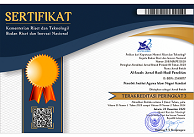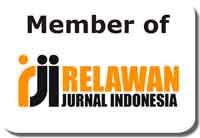Menjadi Muslim Modern: Konstruksi Identitas Anak Muda Muslim di Kafe
Abstract
Keywords
Full Text:
PDFReferences
Ashcroft, B., G. Griffiths, and H. Tiffin. “Post-Modernism.” In Social and Cultural Anthropology: The Key Concepts, edited by Nigel Rapport and Joanna Overing, 294–303. London and New York: Roudlegde, 2000.
Beaumont, Justin. “Transcending the Particular in Postsecular Cities.” Groningen, November 12, 2008. www.rug.nl/frw/nieuws/conference/index2.
Faiz, Muhammad Muqronul dan Abdulloh Hadziq, “Warung Kopi dan Santri: Religion in Secularscapes,” Al-Izzah: Jurnal Hasil-Hasil Penelitian 18, no. 2 (2023): 178-192.
Ferreira, Jennifer, Carlos Ferreira, and Elizabeth Bos. “Spaces of Consumption, Connection, and Community: Exploring the Role of the Coffee Shop in Urban Lives.” Geoforum 119 (February 1, 2021): 21–29. doi:10.1016/j.geoforum.2020.12.024.
Fridolfsson, Charlotte, and Ingemar Elander. “Faith and Place: Constructing Muslim Identity in a Secular Lutheran Society.” Cultural Geographies 20, no. 3 (2013): 319–37. doi:10.1177/1474474012464024.
Habermas, Jurgen. The Structural Transformation of the Public Sphere. Cambridge: The MIT Press, 1989.
Hardiyanti, Nila Yani, and Ratih Puspa. “Coffee Culture Di Indonesia: Pola Konsumsi Konsumen Pengunjung Kafe, Kedai Kopi Dan Warung Kopi Di Gresik.” Medkom: Jurnal Media Dan Komunikasi 01, no. 02 (2021): 93–106. https://e-journal.unair.ac.id/Medkom.
Hasbullah, Hasbullah, Wilaela Wilaela, Masduki Masduki, Jamaluddin Jamaluddin, and Imron Rosidi. “Acceptance of the Existence of Salafi in the Development of Da’wah in Riau Islamic Malay Society.” Cogent Social Sciences 8, no. 1 (2022): 1–15. doi:10.1080/23311886.2022.2107280.
Hattox, Ralph S. Coffee and Coffeehouses: The Origins of a Social Beverage in the Medieval Near East. 3rd ed. Seattle and London: University of Washington Press, 1985.
Indah Indainanto, Yofiendi, and Faiz Albar Nasution. “Representasi Di Media Sosial Sebagai Pembentuk Identitas Budaya Populer.” Jurnal SEMIOTIKA 14, no. 1 (2020): 102–10. http://journal.ubm.ac.id/.
Jones, Steve. Virtual Culture: Identity and Communication in Cybersociety. London: Sage Publications, 1997.
Massey, Doreen. “The Spatial Construction of Youth Cultures.” In Cool Places: Geographies of Youth Cultures, edited by Tracey Skelton and Gill Valentine, 122–30. London and New York: Routledge, 1998.
Ma’sum, Abdul, and Gunawan Gunawan. “Coffee Shop as A Third Place for High School Students in Rembang.” Advances in Social Science, Education and Humanities Research (ASSEHR), 313 (2019): 54–57.
Mehta, Vikas, and Jennifer K. Bosson. “Third Places and the Social Life of Streets.” Environment and Behavior 42, no. 6 (November 2010): 779–805. doi:10.1177/0013916509344677.
Minanto, Ali. “Kota, Ruang, Dan Politik: Produksi Dan Konsumsi Ruang Bersenang-Senang Dalam Geliat Yogyakarta.” Jurnal Komunikasi 13, no. 1 (2018): 41–56.
Misbah, Aflahal. “Kopi, Warung Kopi Dan Potensi Studi Keislaman.” Al-A’raf: Jurnal Pemikiran Islam Dan Filsafat 15, no. 2 (December 31, 2018): 171–200. doi:10.22515/ajpif.v15i2.1384.
———. “Potret Lanskap Harmoni Dalam Proses Propagasi Sufisme Di Warung Kopi Yogyakarta” 17, no. 1 (2018): 92–108.
Murray, Michael. “Narrative Data.” In The SAGE Handbook of Qualitative Data Collection, edited by Uwe Flick, 264–79. London: SAGE Publications, 2018.
Naafs, Suzanne, and Ben White. “Intermediate Generations: Reflections on Indonesian Youth Studies.” Asia Pacific Journal of Anthropology 13, no. 1 (February 2012): 3–20. doi:10.1080/14442213.2012.645796.
Öberg, Peter, and Lars Tornstam. “Youthfulness and Fitness—Identity Ideals for All Ages?” Journal of Aging and Identity 6 (2001): 15–29.
Oldenburg, Ray. The Great Good Place: Cafes, Coffee Shops, Bookstores, Bars, Hair Salons, and Other Hangouts at the Heart of a Community. Cambridge: Da Capo Press, 1999.
Page, Ruth E. Stories and Social Media: Identities and Interaction. New York: Routledge, 2012.
Rafi, Muhammad, Eko Priyo Purnomo, and Baskoro Wicaksono. “Riau Malay Identity Politics.” Jurnal Antropologi: Isu-Isu Sosial Budaya 22, no. 1 (May 31, 2020): 112. doi:10.25077/jantro.v22.n1.p112-120.2020.
Rosidi, Imron. “Anak Muda Muslim Di Pekanbaru: Konsumsi, Identitas Dan Globalisasi.” Madania: Jurnal Ilmu-Ilmu Keislaman 10, no. 2 (2020): 67–75.
Sango, Newman, Ichsan Malik, and I Gede Sumertha Ky. “The Acculturation of Peace and Cultural Value between Javanese Transmigrants and Malayan Society in Riau Province.” International Journal of Arts and Social Science 5, no. 7 (2022): 59–64. www.ijassjournal.com.
Schielke, Samuli. “Being Good in Ramadan: Ambivalence, Fragmentation, and the Moral Self in the Lives of Young Egyptians.” Journal of the Royal Anthropological Institute 15, no. 51 (2009): 524–40.
Sireki, Talenta Nanda, and Bambang Hari Wibisono. “Karakteristik Third Place Dan Tipologi Kafe Di Yogyakarta Kasus: Kawasan Karangwuni Dan Sekitarnya.” TATALOKA 22, no. 3 (August 31, 2020): 437–52. doi:10.14710/tataloka.22.3.437-452.
Smith-Hefner, Nancy. “‘Hypersexed’ Youth and the New Muslim Sexology in Java, Indonesia.” RIMA: Review of Indonesian and Malaysian Affairs 43, no. 1 (2009): 209–44.
Soedarsono, Dewi K., Bahtiar Mohamad, Adamu Abbas Adamu, and Kennia Aline Pradita. “Managing Digital Marketing Communication of Coffee Shop Using Instagram.” International Journal of Interactive Mobile Technologies 14, no. 5 (2020): 108–18. doi:10.3991/IJIM.V14I05.13351.
Spracklen, Karl. Digital Leisure, the Internet and Popular Culture: Communities and Identities in a Digital Age. United Kingdom: Palgrave Macmillan, 2015.
Sweetser, Heather Marie, and Joseph Zeidan. “A Chapter in the History of Coffee: A Critical Edition and Translation of Murtad} A> Az-Zabīdī’s Epistle on Coffee.” The Ohio State University, 2012.
Teixeira, Lucas de Vasconcelos. “The Consumption of Experiences in Specialty Coffee Shops.” In Coffee Consumption and Industry Strategies in Brazil, edited by Luciana Florêncio de Almeida and Eduardo Eugênio Spers, 275–96. Cambridge: Woodhead Publishing, 2020.
Weber, Sandra, and Claudia Mitchell. “Imagining, Keyboarding, and Posting Identities: Young People and New Media Technologies.” In Youth, Identity, and Digital Media, edited by David Buckingham, John D., and Catherine T. MacArthur, 25–48. Cambridge: The MIT Press, 2008. doi:10.1162/dmal.9780262524834.025.
Wibowo, Ari. “Potensi Dan Tantangan Kopi Di Era Milenial.” Warta 31, no. 2 (2019): 16–23. https://bp-guide.id/AXvm8p4n.
Wulandari, Happy, Abdul Muati Ahmad, and Jusang Bolong. “Pekanbaru City Citizens Motivations in Communicating with Refugees in Indonesia.” In Proceedings of the Second International Conference on Social, Economy, Education and Humanity (ICoSEEH 2019) - Sustainable Development in Developing Country for Facing Industrial Revolution 4.0, 465–71. Pekanbaru: SCITEPRESS – Science and Technology Publications, 2019.
Zainuddin, Zamzami, and Muhammad Shujahat. “Understanding Students’ Activities in Wi-Fi Coffee Shops in Aceh: A Survey and Narrative Interview Report.” Englisia: Journal of Language, Education, and Humanities 10, no. 1 (November 1, 2022): 217. doi:10.22373/ej.v10i1.15167.
DOI: http://dx.doi.org/10.31332/ai.v0i0.8597
Copyright (c) 2024 Dony Arung Triantoro, Yudhisti Indra FZ

This work is licensed under a Creative Commons Attribution-NonCommercial-ShareAlike 4.0 International License.










